For seven weeks tens of thousands of Amazonian Indians blocked roads and rivers across eastern Peru. They seized hydroelectric plants and pumping stations on oil and gas pipelines to try to force the repeal of decrees facilitating oil exploration, commercial farming and logging in parts of the jungle. Petroperu, the state oil company, had to shut a pipeline that carries 40,000 barrels of oil each day. Amid threats of energy rationing in eastern towns, the government of President Alan García this month ordered armed police to clear a stretch of road and retake a pumping station near Bagua, in Peru’s northern jungle
—-
THE BACKGROUND
Early this morning (June 5th), Peruvian police launched a violent attack on a nonviolent road blockade held by Amazonian indigenous protesters opposing 10 laws that would open up their territory to increased mineral, oil, gas and timber exploitation. Police opened fire with live ammunition, killing at least 28 people.
FMI:
http://www.rootforce.org/2009/06/05/peruvian-police-murder-indigenous-protesters-take-action/
WHY TAKE ACTION
The first reason to take action, of course, is simply out of solidarity with our fellow warriors in the struggle for a just and sustainable world. But why are we sending out this action alert as Root Force?
For nearly two months, thousands indigenous protesters have nearly paralyzed Peru’s Amazon region with blockades of critical transportation and mining infrastructure. They have sparked a national discourse over the limits to development and who owns nature, and have made it clear that they will not surrender any of their ancestral homelands.
At the heart of the issue are 10 laws passed by presidential decree that would greatly facilitate industrial exploitation of the Amazon. THIS IS CRITICAL INFRASTRUCTURE, intended to supply new raw materials for the global market. THIS IS ONE OF THOSE WEAK POINTS OF THE SYSTEM that we are always talking about.
The indigenous warriors fighting for their lives have pushed this issue into the global eye, and the Peruvian government has placed itself in a position of weakness by murdering unarmed protesters. Even before the recent killings, a congressional panel had already declared 2 of the laws unconstitutional, and only through procedural tricks has the president’s party been able to stall debate on repealing one of those laws.
This is one of those rare cases where SUSTAINED INTERNATIONAL PRESSURE COULD TIP THE SCALES. If these laws are repealed, it will be a major setback for infrastructure expansion plans in a truly critical region of the hemisphere.
HOW TO TAKE ACTION
You can email critical people in the Peruvian government through this link, provided by Amazon Watch:
http://amazonwatch.org/peru-action-alert.php
You can also organize protests at Peruvian embassies or consulates, or take other actions that you think stand a good chance of making it back to the decision makers in Lima.
Make sure to express your outrage at the government’s strong arm tactics — even before the murders, the government had suspended civil liberties in 5 provinces and was calling indigenous people “terrorists” — and demand the repeal of the Free Trade laws and any law further opening the Amazon to mineral, oil, gas, timber, hydroelectric or agricultural exploitation.
In Solidarity,
Root Force
—–
Recent reports indicate as many as 84 people killed and 150 arrested in clashes stemming from an early morning violent raid by police on unarmed protesters on June 5. Police are reported to be burning the bodies of the dead and dumping them into the river.
Astonishingly — but not surprisingly — the government is accusing the protesters of using tactics reminiscent of the 1980s internal conflict. Deploying racist imagery painting indigenous protesters as spear-wielding savages, President Alan Garcia has vowed a tough “response.”
Following the early-morning massacre, protesters took 38 police hostage at a pumping station for the national oil company, PetroPeru. A police raid to free the officers resulted in the deaths of nine of them. An Argentinian oil company, Pluspetrol, has halted oil pumping in one unit and will soon halt pumping in another due to the unrest.
The government has since issued an arrest warrant for indigenous leader Alberto Pizango (who was elected to represent the indigenous coalition by the leaders of 1,200 communities), charging him with “sedition.” Pizango has gone into hiding.
Please take action and urge the Peruvian government to halt the violence and repeal the controversial free trade laws that would open up indigenous land in the Amazon to increased development. Contact the US government and international agencies as well, and encourage them to place pressure on Peru. The Peruvian government is in a serious position of weakness right now and trying to cover it up with violence, and this is one of those rare cases where international pressure could deal a major setback to infrastructure expansion plans.
Read the full Root Force action alert on this issue here.
——
Indigenous Leaders and Allies Call for an End to Violence on All Sides
BAGUA, Peru – June 8 – In the aftermath of Friday’s bloody raid on a peaceful indigenous road blockade near Bagua in the Peruvian Amazon, numerous eyewitnesses are reporting that the Special Forces of the Peruvian Police have been disposing of the bodies of indigenous protesters who were killed.
“Today I spoke to many eyewitnesses in Bagua reporting that they saw police throw the bodies of the dead into the Marañon River from a helicopter in an apparent attempt by the Government to underreport the number of indigenous people killed by police,” said Gregor MacLennan, spokesperson for Amazon Watch speaking.
“Hospital workers in Bagua Chica and Bagua Grande corroborated that the police took bodies of the dead from their premises to an undisclosed location. I spoke to several people who reported that there are bodies lying at the bottom of a deep crevasse up in the hills, about 2 kilometers from the incident site. When the Church and local leaders went to investigate, the police stopped them from approaching the area,” reported MacLennan.
Police and government officials have been consistently underreporting the number of indigenous people killed by police gunfire. Indigenous organizations place the number of protesters killed at least at 40, while Government officials claiming that only a handful of indigenous people were killed. Also the Garcia Government claims that 22 police officers were killed and several still missing.
“Witnesses say that it was the police who opened fire last Friday on the protesters from helicopters,” MacLennan said. “Now the government appears to be destroying the bodies of slain protesters and giving very low estimates of the casualty. Given that the demonstrators were unarmed or carrying only wooden spears and the police were firing automatic weapons, the actual number of indigenous people killed is likely to be much higher.”
“Another eyewitness reported seeing the bodies of five indigenous people that had been burned beyond identification at the morgue. I have listened to testimony of people in tears talking about witnessing the police burning bodies,” continued MacLennan.
At least 150 people from the demonstration on Friday are still being detained. Eye-witness reports also confirm that police forcibly removed some of the wounded indigenous protesters from hospitals, taking them to unknown destinations. Their families expressed concern for their well being while in detention. There are many people still reported missing and access to medical attention in the region is horribly inadequate.
The Organizing Committee for the Indigenous Peoples of Alto Amazonas Province issued this statement: “It is appalling that political powers have acted in such a cruel and inhuman manner against Amazonian Peoples, failing to recognize the fundamental rights and protections guaranteed to us by the Constitution. We express deep grief over the death of our indigenous brothers, of civilians and the officers of the National Police.”
The government expanded the State of Emergency and established a curfew on all traffic in the region from 3 pm to 6 am. Indigenous and international human rights organizations are worried about plans of another National Police raid on a blockade in Yurimaguas close to the town of Tarapoto where thousands are blocking a road.
President Alan Garcia is being widely criticized for fomenting a climate of fear mongering against indigenous peoples by drawing parallels to the brutal Shinning Path guerrilla movement of the 1980s and early 1990s, and by vaguely referring to external and anti-democratic threats to the country.
The Amazonian indigenous peoples’ mobilizations have been peaceful, locally coordinated, and extremely well organized for nearly two months. Yet Garcia insists on calling them terrorist acts and anti-democratic. Garcia has even gone so far as to describe the indigenous mobilizations as “savage and barbaric.” Garcia has made his discrimination explicit, saying directly that the Amazonian indigenous people are not first-class citizens.
“These people don’t have crowns,” Garcia said about the protesters. “These people aren’t first-class citizens who can say — 400,000 natives to 28 million Peruvians — ‘You don’t have the right to be here.’ No way. That is a huge error.”
Ironically, Peru was the country that introduced the United Nations Declaration on the Rights of Indigenous Peoples on the floor of the General Assembly when it was adopted in September 2007.
A coalition of indigenous and human rights organizations will protest in front of the Peruvian Embassy in Washington D.C. on Monday, June 8 at 12:30 pm.
Indigenous peoples have vowed to continue protests until the Peruvian Congress revokes the “free trade” decrees issued by President Garcia under special powers granted by Congress in the context of the Free Trade Agreement with the United States.
Among the outpouring of statements condemning the violence in Peru were those from Peru’s Ombudsman’s office, the chair of the United Nations Permanent Forum on Indigenous Issues, a coalition of 45 international human rights organizations, Indigenous organizations from throughout the Americas, and the Conference of Bishops of Peru. Also famous personalities including Q’orianka Kilcher, Benjamin Bratt, Peter Bratt, and Daryl Hannah and Bianca Jagger called on the Peruvian Government to cease the violence and seek peaceful resolution to the conflict.
AIDESEP, the national indigenous organization of Peru has called for a nationwide general strike starting June 11th.
Amazon Watch is continually updating photographs, audio testimony, and video footage from Bagua on www.amazonwatch.org.
Newly released b-roll at http://amazonwatch.org/peru-protests-highres-photos.php
—–
—–
The broadening influence of the indigenous movement was on display Thursday in a general strike that drew thousands of protesters here to the streets of Iquitos, the largest Peruvian city in the Amazon, and to cities and towns elsewhere in jungle areas. Protests over Mr. García’s handling of the violence in the northern Bagua Province last Friday also took place in highland regions like Puno, near the Bolivian border, and in Lima and Arequipa on the Pacific coast.
“The government made the situation worse with its condescending depiction of us as gangs of savages in the forest,” said Wagner Musoline Acho, 24, an Awajún Indian and an indigenous leader. “They think we can be tricked by a maneuver like suspending a couple of decrees for a few weeks and then reintroducing them, and they are wrong.”
The protesters’ immediate threat – to cut the supply of oil and natural gas to Lima, the capital – seems to have subsided, with protesters partly withdrawing from their occupation of oil installations in the jungle. But as anger festers, indigenous leaders here said they could easily try to shut down energy installations again to exert pressure on Mr. García.
Another wave of protests appears likely because indigenous groups are demanding that the decrees be repealed and not just suspended. The decrees would open large jungle areas to investment and allow companies to bypass indigenous groups to obtain permits for petroleum exploration, logging and building hydroelectric dams. A stopgap attempt to halt earlier indigenous protests in the Amazon last August failed to prevent them from being reinitiated more forcefully in April.
…
The authorities are struggling to understand a movement that is crystallizing in the Peruvian Amazon among more than 50 indigenous groups. They include about 300,000 people, accounting for only about 1 percent of Peru’s population, but they live in strategically important and resource-rich locations, which are scattered throughout jungle areas that account for nearly two-thirds of Peru’s territory.
So far, alliances have proved elusive between Indians in the Amazon and indigenous groups in highland areas, ruling out, for now, the kind of broad indigenous protest movements that helped oust governments in neighboring Ecuador and Bolivia earlier in the decade.
In contrast to some earlier efforts to organize indigenous groups, the leaders of this new movement are themselves indigenous, and not white or mestizo urban intellectuals. They are well organized and use a web of radio stations to exchange information across the jungle. After one prominent leader, Alberto Pizango [who explicity links the struggles there to global climate change everywhere], was granted asylum in Nicaragua this week, others quickly emerged to articulate demands.

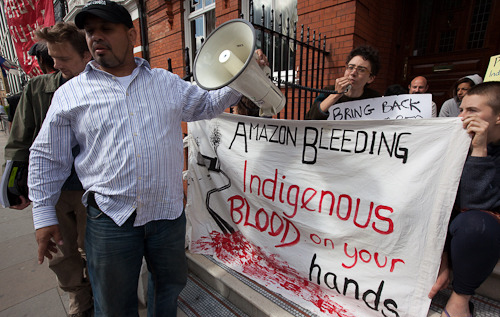 19 June 2009
19 June 2009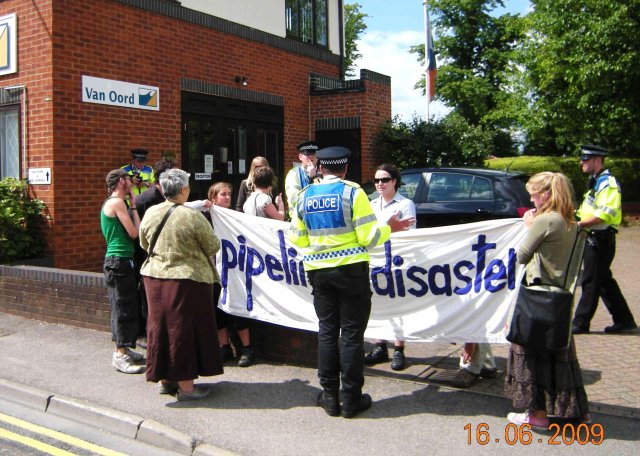 An account of todays (16/06/2009) action against Van Oord UK, owners of the dredgers operating in Broadhaven Bay, and in Solidarity with the people of Erris in their 10 year struggle.
An account of todays (16/06/2009) action against Van Oord UK, owners of the dredgers operating in Broadhaven Bay, and in Solidarity with the people of Erris in their 10 year struggle.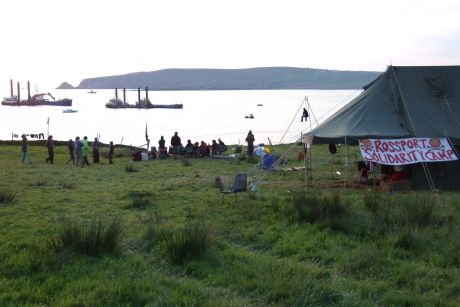 Work continues in Glengad, but so does action resisting the pipeline. The Rossport Solidarity Camp is active and running, so please come and visit! Come and see what is happening with your own eyes, and bring whatever skills and talents you would like to share. Here is a five day update.
Work continues in Glengad, but so does action resisting the pipeline. The Rossport Solidarity Camp is active and running, so please come and visit! Come and see what is happening with your own eyes, and bring whatever skills and talents you would like to share. Here is a five day update.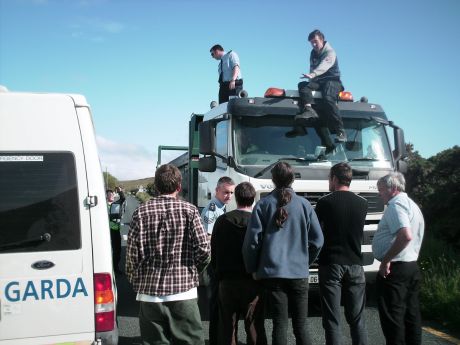 Truck blockade:
Truck blockade:
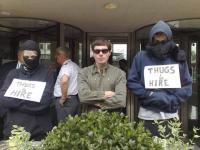 The main doors at Shells headquarters were closed to staff at 9am today, 12 June as protesters dressed as ‘thugs’ turned up for a job interview. Shell security locked all doors as protesters tried to enter the building for what they said was a job interview “we hear Shell are hiring thugs to sink ships in Ireland”.
The main doors at Shells headquarters were closed to staff at 9am today, 12 June as protesters dressed as ‘thugs’ turned up for a job interview. Shell security locked all doors as protesters tried to enter the building for what they said was a job interview “we hear Shell are hiring thugs to sink ships in Ireland”.